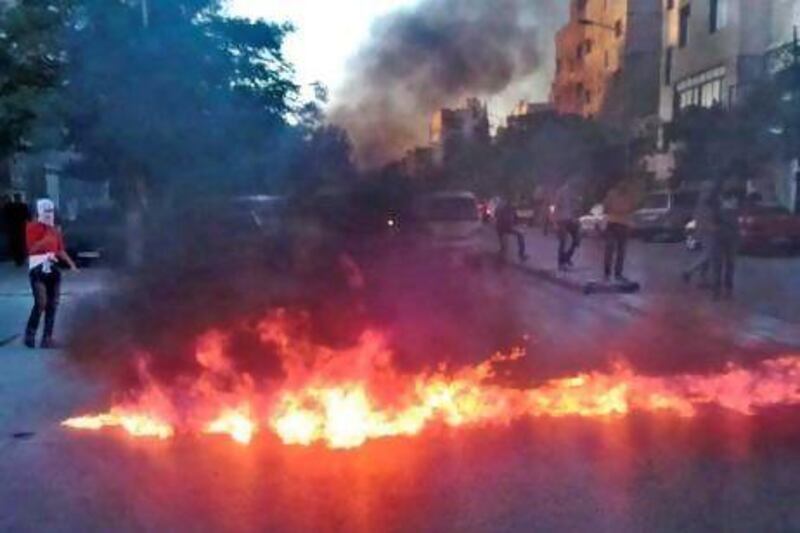ISTANBUL // Rebels in Syria say they will no longer feel bound by a UN ceasefire unless the ruling regime begins complying with the agreement effective tomorrow.
Also, Turkey said all options to end the violence, including military intervention, should be explored.
Rebels in Syria said the regime of Syria’s president Bashar Al Assad had until noon today to adhere to the demand of UN special envoy Kofi Annan to stop the fighting.
A statement issued by the Free Syrian Army (FSA) command inside Syria on Wednesday said that if the regime “does not meet the deadline by Friday midday, the command ... will no longer be tied by any commitment to the Annan plan ... and our duty will be ... to defend civilians”, according to Agence France-Presse.
The FSA singled out last weekend’s massacre near Houla in which 108 people died, including 49 children and 34 women.
“After the barbarous massacre of women and children at Houla ... we announce that there is no more justification for us to unilaterally respect the truce because [Assad] has buried Annan’s plan,” the FSA said.
But FSA commander, Col Riyad Al Assaad, who is in Turkey, yesterday told Al Jazeera there was no deadline. Instead, Col Assaad said, Mr Annan should declare officially that his ceasefire plan, which was announced in April, had failed. That would allow the FSA to resume attacks on government forces without violating Mr Annan’s demands.
Ahmet Davutoglu, the Turkish foreign minister, told a television interviewer in Istanbul the Assad regime had passed a “turning point” with the massacre in Houla.
“We have to try all avenues and explore all options,” Mr Davutoglu told the interview on NTV, a private Turkish news channel.
“Nobody, and certainly not a country like Turkey, is regarding military intervention as a first choice in any way” to end the bloodshed in Syria that had cost the lives of more than 15,000 people since an uprising against Mr Al Assad began in March 2011, the minister said.
“But we know how heavy the price of staying a spectator turned out to be in the three and a half years of massacres in Bosnia-Herzegovina - 300,000 people died,” he said, referring to the conflict in the former Yugoslavia that triggered military intervention by Nato.
Mr Davutoglu was scheduled to talk to his French counterpart Laurent Fabius later in the day, according to a Turkish diplomat.
The new French government has indicated that military force could be used in Syria.
The Turkish foreign minister’s interview came a day after Recep Tayyip Erdogan, the prime minister, confirmed that a military option in the form of a military buffer zone on Turkey’s border with Syria was still on the table.
“Those are all steps to be taken according to the developments,” Mr Erdogan told Turkish reporters in response to a question about a buffer zone. He stressed no decision had been taken yet. A Turkish official, speaking on condition of anonymity, said yesterday that Ankara was “ready for every eventuality”.
Turkey and Syria share a border of 900 kilometres, and Ankara says it is increasingly concerned about a growing presence of Kurdish rebels in regions on the Syrian side of the border.
Last week, two Kurdish militants who had crossed from Syria into Turkey with about 40 kilograms of explosives died in an explosion in central Anatolia, according to Turkish authorities. A policeman also died. Ankara says the two militants probably were on their way to a city like Ankara or Istanbul to carry out a major attack.
Also in Istanbul yesterday, UN chief Ban Ki-moon called on the Assad regime to implement Mr Annan’s plan, which includes a ceasefire but also provisions to release political prisoners and accept peaceful demonstrations by the opposition.
Mr Ban told a forum in Istanbul the government of Syria should “act on its commitment to the Annan peace plan” and “act on its responsibilities to its people.” Referring to the Houla massacre, he said the bodies were counted by UN observers, “our eyes and ears of the international community.”
On Wednesday, the UN observer mission chief in Syria, Major General Robert Mood, said 13 people had been killed in a new massacre in Syria.
US ambassador to the United Nations Susan Rice warned on Wednesday that prospects for a political solution — part of the Annan plan — are now “almost non-existent” and that the Security Council must discuss new action against Damascus.
Ms Rice said increased pressure “could include sanctions of the sort that have been alluded to and discussed, and we were among those that raised that possibility,” she said. Veto powers Russia and China have blocked all efforts to pass a Security Council measure that would allow foreign military intervention.
tseibert@thenational.ae





